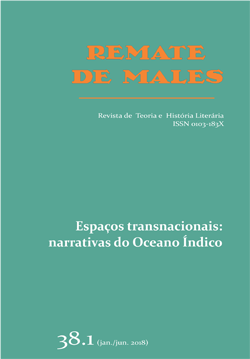Resumo
This article reads Henry James’s bias against his native America ironically. I offer a two-fold reading of the staging and performance of stupidity: it is both a strategy of resistance and a rhetoric of disavowal of responsibility. I contend that Henry James offers Milly Theale, the American rotagonist of “The Wings of the Dove”, the possibility of playing up to European assumptions about the New World through a performance of stupidity. I also argue that feigning ignorance is also renouncing responsibility, as exemplified in Merton Densher’s conduct. James abstains from conclusions, allowing stupidity to rule in the end.Referências
ARMSTRONG, Paul B. Play and the Politics of Reading: The Social Uses of Modernist Form. Ithaca: Cornell University Press, 2005.
BERSANI, Leo. A Future for Astyanax: Character and Desire in Literature. New York: Columbia University Press, 1984.
BROOKS, Peter. The Melodramatic Imagination: Balzac, Henry James, Melodrama, and the Mode of Excess. New Haven: Yale University Press, 1995.
CAMERON, Sharon. Thinking in Henry James. Chicago: The University of Chicago Press, 1991.
DERRIDA, Jacques. Donner le temps: 1. La fausse monnaie. Paris: Galilée, 1991.
DERRIDA, Jacques. Spectres de Marx: l’état de la dette, le travail du deuil et la nouvelle Internationale. Paris: Galilée, 1993.
DERRIDA, Jacques. Donner la mort. Paris: Galilée, 1999.
DERRIDA, Jacques. Apprendre à vivre enfin: entretien avec Jean Birnbaum. Paris: Galilée, 2005.
FOWLER, Virginia. Henry James’s American Girl: The Embroidery on the Canvas. Madison: The University of Wisconsin Press, 1984.
GILJE, Paul A. The Rise of Capitalism in the Early Republic. In: GILJE, Paul A. (Ed.). Wages of Independence: Capitalism in the Early American Republic. Plymouth: Rowman & Littlefield Publishers, 2006.
GOFFMAN, Erving. Performances. Belief in the part one is playing. In: BIAL, Henry; BRADY, Sarah (Eds.). The Performance Studies Reader. New York: Routledge, 2003.
HEIDEGGER, Martin. Being and Time. Trans. Joan Stambaugh. Albany: SUNY Press, 2010.
HOLLAND, Laurence. The Expense of Vision: Essays on the Craft of Henry James. Princeton: Princeton University Press, 1964.
JAMES, Henry. Hawthorne. In: Essays: American and English Writers. New York: The Library of America, 1984.
JAMES, Henry. The Notebooks of Henry James. Eds. Leon Edel and Lyall Harris Powers. Oxford: Oxford University Press, 1988.
JAMES, Henry. Americans Abroad. In: Collected Travel Writings. New York: The Library of America, 1993[1878].
JAMES, Henry. The Portrait of a Lady. Ed. Robert D. Bamberg. New York: W.W. Norton & Company, 1995[1880-1881].
JAMES, Henry. A Light Man. In: Complete Stories 1864-1874. New York: The Library of America, 1999[1869].
JAMES, Henry. The Wings of the Dove. In: Novels 1901-1902. New York: The Library of America, 2006[1902].
LEVINAS, Emmanuel. Ethics and Infinity. Tans. Richard A. Cohen. Pittsburgh: Duquesne University Press, 1985.
McCALL, Dan. Henry James’s Hawthorne. New England Review (1990-), v. 18, n. 4, 1997, pp. 111-118.
MENGUE, Philippe. Faire l’idiot: la politique de Deleuze. Paris: Germina, 2013.
MILLER, J. Hillis. Literature as Conduct: Speech Acts in Henry James. New York: Fordham University Press, 2005.
NAQVI, Fatimah. The Literary and Cultural Rhetoric of Victimhood. New York: Palgrave Macmillan, 2007.
PIPPIN, Robert. Henry James and Modern Moral Life. Cambridge / New York: Cambridge University Press, 2000.
PUCKETT, Kent. Bad Form: Social Mistakes in the 19th-century Novel. Oxford / New York: Oxford University Press, 2008.
ROBERTS, Priscilla. The Geopolitics of Literature: The Shifting International Theme in the Works of Henry James. The International History Review, v. 34, n. 1, March 2012, pp. 89-114.
RIGHTER, William. American Memory in Henry James: Void and Value. Aldershot: Ashgate, 2004.
RONELL, Avital. Stupidity. Urbana / Chicago: The University of Illinois Press, 2002.
YEAZELL, Ruth. Language and Knowledge in the Late Novels of Henry James. Chicago: Chicago University Press, 1976.
ŽIŽEK, Slavoj. The Parallax View. Cambridge: The MIT Press, 2009.

O periódico Remate de Males utiliza a licença do Creative Commons (CC), preservando assim, a integridade dos artigos em ambiente de acesso aberto.

